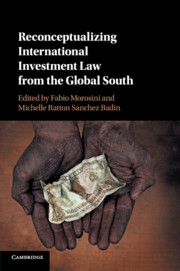12 results
4 - Building Legal Capacity and Adapting State Institutions in Brazil
- from Part II - The Cases of Brazil, India, and China
-
-
- Book:
- Emerging Powers and the World Trading System
- Published online:
- 23 July 2021
- Print publication:
- 22 July 2021, pp 81-127
-
- Chapter
- Export citation
6 - Navigating between Resistance and Conformity with the International Investment Regime
-
-
- Book:
- Reconceptualizing International Investment Law from the Global South
- Published online:
- 20 October 2017
- Print publication:
- 26 October 2017, pp 188-217
-
- Chapter
- Export citation
1 - Reconceptualizing International Investment Law from the Global South
-
-
- Book:
- Reconceptualizing International Investment Law from the Global South
- Published online:
- 20 October 2017
- Print publication:
- 26 October 2017, pp xi-xiv
-
- Chapter
- Export citation
Foreword
-
- Book:
- Reconceptualizing International Investment Law from the Global South
- Published online:
- 20 October 2017
- Print publication:
- 26 October 2017, pp vii-x
-
- Chapter
- Export citation
Notes on Contributors
-
- Book:
- Reconceptualizing International Investment Law from the Global South
- Published online:
- 20 October 2017
- Print publication:
- 26 October 2017, pp v-vi
-
- Chapter
- Export citation
Contents
-
- Book:
- Reconceptualizing International Investment Law from the Global South
- Published online:
- 20 October 2017
- Print publication:
- 26 October 2017, pp i-iv
-
- Chapter
- Export citation
Copyright page
-
- Book:
- Reconceptualizing International Investment Law from the Global South
- Published online:
- 20 October 2017
- Print publication:
- 26 October 2017, pp i-iv
-
- Chapter
- Export citation
Index
-
- Book:
- Reconceptualizing International Investment Law from the Global South
- Published online:
- 20 October 2017
- Print publication:
- 26 October 2017, pp 293-298
-
- Chapter
- Export citation

Reconceptualizing International Investment Law from the Global South
-
- Published online:
- 20 October 2017
- Print publication:
- 26 October 2017
6 - Developmental Responses to the International Trade Legal Game
- from Part II - Trade Law: Carving Out Development Policy Space within the WTO Regime
-
-
- Book:
- Law and the New Developmental State
- Published online:
- 05 June 2013
- Print publication:
- 31 May 2013, pp 246-300
-
- Chapter
- Export citation
Contributors
-
-
- Book:
- Law and the New Developmental State
- Published online:
- 05 June 2013
- Print publication:
- 31 May 2013, pp vii-viii
-
- Chapter
- Export citation
1 - Winning at the WTO: the development of a trade policy community within Brazil
-
-
- Book:
- Dispute Settlement at the WTO
- Published online:
- 07 September 2011
- Print publication:
- 18 November 2010, pp 21-104
-
- Chapter
- Export citation



